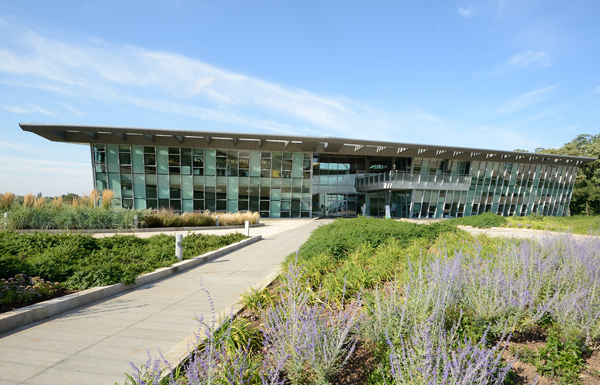UK spin-out Microbiotica wants to be world leader in microbiome drugs

A new Cambridge, UK-based biotech says it wants to become a world leader in developing drugs based on microbiome biology.
The microbiome is made up of trillions of bacteria that live in the human gut and elsewhere in the body, and research shows that it plays a crucial role in regulating health and disease. By fixing deficiencies in an individual patient’s microbiome, new drugs could treat conditions such as Crohn’s disease, multiple sclerosis, cancer and neurological disease.
Microbiotica is a spin-out from the not-for-profit Wellcome Trust Sanger Institute (pictured) which specialises in genome sequencing and has been researching the microbiome since 2010.
The UK biotech will join a small group of companies in the US and Europe already working in the field, but it hopes the expertise of its scientists will give it an advantage over the likes of established rivals such as Seres Health and Vedanta.
Dr Trevor Lawley has been leading research into the microbiome at the Sanger Institute’s Host-Microbiotica Interactions Laboratory (HMIL) and will now look to translate these insights into new medicines.
Dr Lawley will be chief scientific officer at the company, and will work alongside Professor Gordon Dougan, another Sanger Institute expert in genetic analysis of host/pathogen interactions during infection.
The company’s chief executive will be Dr Mike Romanos. A seasoned drug discoverer and entrepreneur in the biotech sector, Dr Romanos held senior global roles at GSK and was chief executive of another Cambridge based biotech, Crescendo Biologics from 2011 to 2015.
Microbiotica says it will use this expertise to build a potential best in class platform for microbiome drugs. This will involve combining an extensive DNA sequencing capability with novel culturing methods, to build a first-in-class gut microbiome culture collection and reference genome library.
Since 2010, Dr Lawley’s group has cultured and sequenced the genome of thousands of bacterial strains from the gut of humans, representing the world’s largest culture collection of intestinal bacteria.
On top of insights into how bacteria affect these diseases, the group has developed an expertise in humanised models for the development of live bacterial therapeutics and what it says is a leading bioinformatics capability.
The newly formed company is being backed by two venture groups, Cambridge Innovation Capital (CIC) and IP Group, who are co-leading the investment with a £4m contribution each, providing a total initial funding of £8m.
Microbiotica will have unique access to Sanger expertise, allowing it to identify specific disease-related bacteria, patient-stratification strategies and novel therapeutics.
It has been granted exclusive rights to existing potentially therapeutic bacterial mixes that have shown striking effects in novel models of disease, and Microbiotica says it will progress these into pre-clinical development over the coming year.
The company will use the funds to establish labs within the Wellcome Genome Campus at Hinxton, Cambridge, to progress multiple live bacteriotherapy discovery programmes into development.
Mike Romanos, chief executive of Microbiotica, said: “It has been a privilege to work with my co-founders Trevor Lawley and Gordon Dougan to create the concept of Microbiotica as a leading player in microbiome-based therapeutics. We are very excited to be working with CIC and IP Group to now turn the vision into reality as we start to build the company, based at the Wellcome Genome Campus, leveraging the strengths of the Sanger Institute to create new medicines.”
The Wellcome Genome Campus is one of the UK’s most fertile sources of new medical research, including spin-out and start-up companies, academic-industry partnerships and Genomics England.
Professor Sir Mike Stratton, Director of the Sanger Institute, said: “Microbiotica grew out of Sanger Institute science and I’m delighted that Trevor and his team will continue to be immersed in the intellectual environment on campus. The Biodata Innovation Centre and the companies in it is the first major step in our progression of our vision for this Campus as a global hub for genomics and biodata.”
Seres setback
Microbiotica is launched just a few months after one of the field’s leaders, Seres Therapeutics, suffered a major setback. In July the US-based company saw its lead compound, SER-109, fail in a phase 2 trial for clostridium difficile infection.
Seres Therapeutics is based in the other Cambridge - Cambridge, Massachusetts – as is another competitor in the field, Vedanta. It raised a substantial $50 million in new equity financing in June.
Other companies exploring the microbiome are Synlogic, which went into partnership with AbbVie earlier this year, and Second Genome, which raised $43 million in the spring, with contributions from Pfizer and Roche.
Another UK based company, 4D pharma, has a treatment in phase 1 development for irritable bowel syndrome (IBS).
The field is split between companies who seek to develop live bacterial therapeutics – such as Microbiotica and 4D - and those such as Seres, which seek to synthesise drugs which mimic the effects of specific bacterial strains.












